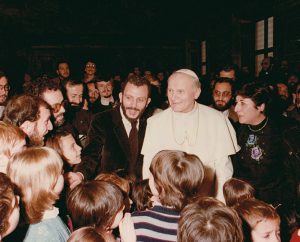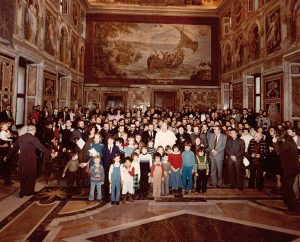Private audience for itinerant catechists in Sala Clementina 1-7-1982
St. John Paul II
Rome, January 7, 1982 *
The Holy Father has received in an Audience three hundred itinerant catechists from the Neocatechumenals Communities from 70 nations.
After a song, Kiko spoke the following words:
“Dearest Father, 300 itinerant catechists from the Neocatechumenal Communities are present here, who have founded the Neocatechumenal Way in 70 nations; They form small teams of evangelization made up of a priest and two laity, like a small community, an image of the Holy Family of Nazareth, who help in the parishes to bring about the renewal of the Second Vatican Council. I, Father, would like to present very briefly the itinerant priests who have come from all the nations, from Australia, from Africa, etc. The priests, stand up for the Holy Father to see you (the priests stand up). Marriages, families who have sold all their property, and their children leave to announce the Gospel, to help in missions around the world. Families with children stand up (families stand up with their children). Celibate girls who have offered their lives for the proclamation of the Gospel are also present. Stand up, girls. Finally, the young boys who have offered their lives to announce the Gospel; five of them have recently decided to go to the seminary (you can sit down).
We have also seen, Father, how in places where the Neocatechumenal Way has been more than ten years, vocations begin to emerge. We are very happy. This year in Italy, 57 young people have risen to go to the seminary and in Spain, 42. We have been together for 20 days near the Sanctuary of Loreto, reflecting on what God is doing in the different nations where we are carrying out our ministry of evangelization. We have gone to stand at the feet of the Virgin Mary to entrust her with our mission and to ask her in the small house of Nazareth in Loreto that, being that our mission is to found small communities such as the Holy Family of Nazareth in parishes that live in humility, simplicity and praise, that she help us to carry it forward. Our greatest wish, which we have asked the Virgin as a secret, has always been to be able to bring these brothers one day here, where Peter is, to the ‘Rock’ on which Christ has wanted to found his Church. Since these brothers must speak with so many bishops in so many nations, who are fixed on the ‘Merkabá’ of God of the evangelization, here we would like to show our deepest adherence by making a kind of gesture of intimacy with you. I have asked them before: Do you recognize that the Bishop of Rome, Peter, is the stone on which Christ has built his Church? And all have responded that they recognize it.
Then I asked them: Do you promise obedience and fidelity to Peter and to all the bishops of the Church who are in communion with him? And they have promised. Then I asked them if they are willing to offer their lives to serve the Church, helping to lead the renewal of the Second Vatican Council through this Neocatechumenal Way that we are taking forward, which wants to renew Baptism in Christians. Everyone has said yes. For this, Father, I would like, on behalf of all of them, to kneel before you, and all these brothers with me, as a small gesture of complete commitment to Peter. Because I, Father, have told you one thing: through my experience in so many nations and the sufferings I have had, I have understood that God obeys his bishops. God Himself obeys them. This has impressed me so much that I have thought: if God himself obeys them, how can I and all of us not obey them?
So now I would like to get down on my knees in front of you.”
(Kiko approaches the Pope’s throne and kneels down, meanwhile all the itinerants kneel: the Pope offers his hand for him to kiss, and rising, he rests his other hand on Kiko’s back; then he invites everyone to get up). The Pope’s speech follows:

“Beloved: 1. I am sincerely happy to meet you today, itinerant catechists who come from numerous Neocatechumenal Communities, and I wish to express my satisfaction along with a word of encouragement for your catechetical work, so valuable to the ecclesial community. You intend to live fully the fundamental announcement of faith, the good news that Jesus of Nazareth is the eternal Son of God, incarnated and risen for your salvation: you want to deeply assume the inseparable bond that exists between adhering to this announcement of life and resurrection and the continuous interior conversion that involves a change of mentality, of attitudes and behaviors of selfishness, closeness and self-sufficiency, to acquire a new perspective and a new vision – precisely the one based on the message of Jesus Christ – that demands humble openness towards God and towards all the brothers. In this journey of faith that certainly presents tiring stages and inevitable difficulties, it sustains, comforts, illuminates and guides the Word of God, the Holy Scripture, which must be deepened, read, meditated upon and studied with the conviction that it is not simply a book, but God Himself who speaks, acts, questions, commits and invites us to listen carefully, leading to total adherence to His will. And the Word of God, both that of the Old Testament and that of the New, leads you to meet the One with whom Scripture is full, with Jesus Christ who, through the incarnation, “has been united in a certain way to each man (Gaudium the Spes. 22).”

2. In your community reflections, you have wanted to meditate on the basilar value of the sacrament of Baptism in the spiritual journey of the Christian, and you wish to live again in your Christian life the complex and rich experience that the Church of the first centuries had her children go through. Without falling into an easy archeology of forms, be aware that realizing the baptismal dimension means, above all, trying to grasp at its very source the authentic identity of being Christian; that is to say, to live the profound change that has taken place in our human reality brought forth by divine grace, by becoming living temples of the Holy Trinity, branches of the vine that is Christ, members of the Mystical Body, of the total Christ, that is, of the church. Writing about the wonderful supernatural effects of Baptism, Bishop Saint Fulbert of Chartres expresses himself saying: ‘We know with certainty that being sinners in the first birth, we are purified in the second: slaves in the first, we are free by the work of the second; earthly in the first, we are heavenly because of the second, carnal because of the first birth, we become spiritual by the grace of the second; because of him, children of wrath, and because of him children of grace, therefore, he who offends the dignity of Baptism, knows that he offends God himself. It is therefore a grace of the doctrine of salvation to know the depth of the mystery. I entrust you to the Virgin Mary so that you may make a personal contribution to the catechesis of Baptism’ (Ep. 5 PL 141, 198 s). Realizing the baptismal dimension means joining intimately with Christ in the Eucharist, font and culmination of the Christian life and of all evangelization (cf. Lumen Gentium, 11; Presbyterorum Ordinis, 5); it means loving generously, concretely, effectively all men, especially those who are spiritually or materially poor or needy; it means to restructure one’s moral life in coherence and conformity with the promises of Baptism. This way, the way of faith, the way of the rediscovery of Baptism – I said to your friends in the parish of the Canadian Martyrs of Rome – must be the way of the new man; he sees what is the true proportion or, better, the disproportion of his created entity, of the character of his physical body, with respect to the Creator, of his infinite majesty, of the Redeeming God, of the Holy and Sanctifying God, and tries to realize himself in this perspective.’ (L ‘Osservatore Romano, Spanish language edition, January 11, 1981, p. 10).
3. In this liturgical season of Christmas, the Gospels of Matthew and Luke introduce us to some people whose behavior towards the newborn Jesus is particularly exemplary for us: the mysterious Wise Men, with the richness of their culture, attentive and sensitive to the signs of transcendence; the poor shepherds watching over their flock, prompt and obedient to the announcement of the Angels; Joseph, the just man, who in static dream is continually listening to the will of the Eternal God; and, above all, Mary, the Virgin Mother who entrusts herself to God completely, pronounces the ‘fiat’ and conceives in her womb the Son of the Most High to offer and give him to men. To her in a special way, dear brothers and sisters, I entrust you and I entrust your generous commitment, so that, in perfect and harmonious adherence to the Church, and always under the pastoral direction of the bishops, you may make a personal contribution to the fundamental work of catechesis, acting carefully that you do not transmit your doctrine or that of another teacher, but ‘the teaching of Jesus Christ, the Truth that He communicates or, more exactly, the Truth that He is.’ (Catechesi Tradendae, 6)“
With these wishes and as a sign of my affection I cordially impart to you the Apostolic Blessing.”
(*) Cfr. «L’Osservatore Romano», 7-8 January 1982.